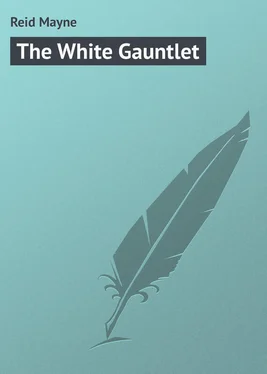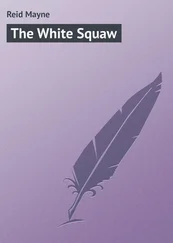Mayne Reid - The White Gauntlet
Здесь есть возможность читать онлайн «Mayne Reid - The White Gauntlet» — ознакомительный отрывок электронной книги совершенно бесплатно, а после прочтения отрывка купить полную версию. В некоторых случаях можно слушать аудио, скачать через торрент в формате fb2 и присутствует краткое содержание. Жанр: foreign_prose, foreign_children, на английском языке. Описание произведения, (предисловие) а так же отзывы посетителей доступны на портале библиотеки ЛибКат.
- Название:The White Gauntlet
- Автор:
- Жанр:
- Год:неизвестен
- ISBN:нет данных
- Рейтинг книги:5 / 5. Голосов: 1
-
Избранное:Добавить в избранное
- Отзывы:
-
Ваша оценка:
- 100
- 1
- 2
- 3
- 4
- 5
The White Gauntlet: краткое содержание, описание и аннотация
Предлагаем к чтению аннотацию, описание, краткое содержание или предисловие (зависит от того, что написал сам автор книги «The White Gauntlet»). Если вы не нашли необходимую информацию о книге — напишите в комментариях, мы постараемся отыскать её.
The White Gauntlet — читать онлайн ознакомительный отрывок
Ниже представлен текст книги, разбитый по страницам. Система сохранения места последней прочитанной страницы, позволяет с удобством читать онлайн бесплатно книгу «The White Gauntlet», без необходимости каждый раз заново искать на чём Вы остановились. Поставьте закладку, и сможете в любой момент перейти на страницу, на которой закончили чтение.
Интервал:
Закладка:
“Low-born peasant!” cried the cuirassier, his face turning purple as he spoke, “if thou wert worthy a sword, I’d spit thee like a red-herring. Keep off, churl, or I may be tempted to take thy life!”
As he uttered this conditional threat, he drew his sword; and stood with the blade pointing towards the breast of bold Robin.
There was an interval of profound silence. It was terminated by a voice among the crowd crying out: – “Yonder comes the man that’ll punish him!”
All eyes were turned towards the elevated platform, on which stood the “people of quality.” There was a commotion among the cavaliers. One, who had separated from the rest, was seen hurrying down the sloping side of the moat, and making direct for the scene of the contention.
He had only a dozen steps to go; and, before either the pseudo-outlaw of Sherwood-forest, and his mailed adversary, could change their relative positions, he had glided in between them.
The first intimation the cuirassier had of a true antagonist, was, when a bright sword-blade rasped against his own, striking sparks of fire from the steel; and he beheld standing in front of him, no longer a “low-born peasant,” clad in Kendal Green, but a cavalier in laced doublet, elegantly attired as himself, and equally as determined.
This new climax silenced the spectators, as suddenly, as if the wand of an enchanter had turned them into stone; and it was not till after some seconds had elapsed that murmurs of applause rose round the ring, coupled with that popular cry, “ Huzza for the black horseman !”
For a moment the captain of cuirassiers seemed awed into silence. Only for a moment, and only by the suddenness of the encounter. Swaggerer as he may have been, Scarthe was no coward; and under the circumstances even a coward must have shown courage. Though still under the influence of a partial intoxication, he knew that bright eyes were upon him; he knew that high-born dames were standing within ten paces of the spot; and, though hitherto, for reasons of his own, pretending to ignore their presence, he knew they had been spectators of all that had passed. He had no intention, therefore, of showing the white feather.
Perhaps it was the individual, who had thus presented himself, as much as his sudden appearance, that held him for the moment speechless: for in the antagonist before him, Scarthe recognised the cavalier, who in front of the roadside inn had daringly drunk —
“To the People!”
The souvenir of this insult, added to this new defiance, furnished a double stimulus to his resentment – which at length found expression in words.
“You it is, disloyal knave? You!”
“Disloyal or not,” calmly returned the cavalier, “I demand reparation for the slight you have offered to this respectable assemblage. Your free fashions may do for Flanders – where I presume you’ve been practising them – but I must teach you to salute the fair maidens of England in a different style.”
“And who are you, who propose to give the lesson?”
“No low-born peasant , Captain Richard Scarthe! Don’t fancy you can screen yourself behind that coward’s cloak. You must fight, or apologise?”
“Apologise!” shouted the soldier, in a furious voice, “Captain Scarthe apologise! Ha! ha! ha! Hear that Cornet Stubbs? Did you ever know me to apologise?”
“Never, by Ged!” muttered Stubbs in reply.
“As you will then,” said the cavalier, placing himself in an attitude to commence the combat.
“No, no!” cried Maid Marian, throwing herself in front of Holtspur, as if to screen his body with her own. “You must not, sir. It is not fair. He is in armour, and you, sir – ”
“No – it arn’t fair!” proclaimed several voices; while at the same moment, a large fierce-looking man, with bushy black beard, was seen pushing his way through the crowd towards the spot occupied by the adversaries.
“Twoant do, Master Henry,” cried the bearded man as he came up. “You mustn’t risk it that way. I know ye’re game for any man on the groun’, or in England eyther; but it arn’t fair. The sodger captain must peel off them steel plates o’ his; and let the fight be a fair ’un. What say ye, meeats?”
This appeal to the bystanders was answered by cries of “Fair play! fair play! The officer must take off his armour!”
“Certainly,” said Walter Wade, at this moment coming up. “If these gentlemen are to fight, the conditions must be equal. Of course, Captain Scarthe, you will not object to that?”
“I desire no advantage,” rejoined the cuirassier captain. “He may do as he likes; but I shall not lay aside my armour on any account.”
“Then your antagonist must arm also,” suggested one of the gentlemen, who had accompanied Walter. “The combat cannot go on, till that be arranged.”
“No! no!” chimed in several voices, “both should be armed alike.”
“Perhaps this gentleman,” said one, pointing to the cornet, “will have no objection to lend his for the occasion? That would simplify matters. It appears to be about the right size.”
Stubbs looked towards his captain, as much as to say, “Shall I refuse?”
“Let him have it!” said Scarthe, seeing that the proposal could not well be declined.
“He’s welcome to it!” said the cornet, who instantly commenced unbuckling.
There were hands enough to assist Henry Holtspur in putting on the defensive harness; and, in a few minutes’ time, he was encased in the steel accoutrements of the cornet – cuirass and gorget, pauldrons, cuisses, and braces – all of which fortunately fitted, as if they had been made for him.
The helmet still remained in the hand of one of the attendants – who made a motion towards placing it upon Holtspur’s head.
“No!” said the latter, pushing it away. “I prefer wearing my beaver.” Then pointing to the trophy set above its brim, he added, “It carries that which will sufficiently protect my head. An English maiden has been insulted, and under the glove of an English maiden shall the insult be rebuked.”
“Don’t be so confident in the virtue of your pretty trophy,” rejoined Scarthe with a sarcastic sneer. “Ere long I shall take that glove from your hat, and stick it on the crest of my helmet. No doubt I shall then have come by it more honestly than you have done.”
“Time enough to talk of wearing, when you have won it,” quietly retorted the cavalier. “Though, by my troth,” added he, returning sneer for sneer, “you should strive hard to obtain it; you stand in need of a trophy to neutralise the loss of your spurs left behind you in the ford of Newburn.”
The “ford of Newburn” was Scarthe’s especial fiend. He was one of that five thousand horsemen, who under Conway had ignominiously retreated from the Tyne – spreading such a panic throughout the whole English army, as to carry it without stop or stay far into the heart of Yorkshire. Once before had Holtspur flung the disgraceful souvenir in his teeth; and now to be a second time reproached with it, before a crowd of his countrymen, before his own followers – many of whom had by this time entered within the camp – but above all, in presence of that more distinguished circle of proud and resplendent spectators, standing within earshot, on the moat above – that was the direst insult to which he had ever been subjected. As his antagonist repeated the taunting allusion, his brow already dark, grew visibly darker; while his thin lips whitened, as if the blood had altogether forsaken them.
“Base demagogue!” cried he, hissing the words through his clenched teeth, “your false tongue shall be soon silenced. On the escutcheon of Captain Scarthe there is no stain, save the blood of his enemies, and the enemies of his king. Yours shall be mingled with the rest.”
Читать дальшеИнтервал:
Закладка:
Похожие книги на «The White Gauntlet»
Представляем Вашему вниманию похожие книги на «The White Gauntlet» списком для выбора. Мы отобрали схожую по названию и смыслу литературу в надежде предоставить читателям больше вариантов отыскать новые, интересные, ещё непрочитанные произведения.
Обсуждение, отзывы о книге «The White Gauntlet» и просто собственные мнения читателей. Оставьте ваши комментарии, напишите, что Вы думаете о произведении, его смысле или главных героях. Укажите что конкретно понравилось, а что нет, и почему Вы так считаете.












